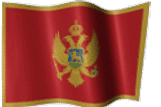Montenegro, as a candidate country that has been negotiating EU membership for more than 10 years, was insufficiently present on the EU agenda during 2022, since there were no high-level meetings through intergovernmental conference meetings, is the message from the sixteenth meeting of the Joint Consultative Committee of Civil of the Society of the European Union and Montenegro (ZKO), which was held today in Podgorica.
The meeting was co-chaired by Andrej Zorko and Pavle D. Radovanović, who reminded that the JCC body was established in accordance with the Stabilization and Association Agreement, which enables civil society organizations to monitor the negotiation process and submit recommendations to the Government of Montenegro and the EU institutions in order to improve the negotiation process. The board was formed after the Economic and Social Council of the EU, which is an advisory body of the European Commission and the European Parliament.
State Secretary in the Ministry of European Affairs, Milena Žižić, said that although the importance of including civil society in the negotiation structure was recognized from the very beginning of the negotiation process, it still did not fully valorize the knowledge and experience that the civil sector has at its disposal, which is often crucial for the return information on how the legal acquis of the EU harmonized with the Montenegrin legislation is implemented in practice in our country.
EU Ambassador to Montenegro Oana Christina Popa emphasized that a strong civil society is crucial for Montenegro’s path to the European Union. “Mechanisms of consultation and cooperation between Montenegrin state institutions and civil society should be further improved, as well as the legal and institutional framework,” she announced, adding that the European Union is ready to encourage and support the mentioned processes. Ambassador Popa expressed her belief that Montenegro will be able to overcome the most significant current domestic challenges. “In most of these areas, civil society and social actors must play a key role,” she concluded.
The members of the negotiation structure from the Ministries of European Affairs and Justice, Miloš Radonjić and Bojan Božović, and members of the JCC from NGOs spoke within the three topics of the agenda, which include the First Cluster of the Revised Enlargement Methodology – Fundamental Chapters, as well as the members of the civil society sector in Montenegro, prof. Gordana Đurović (CPEU) and Marina Vujačić (UMHCG). Also, representatives of non-governmental organizations participated in the panels: Milena Bešić (CEDEM), Pavle Ćupić (GA), Dragana Jaćimović (IA), Dejan Milovac (MANS) and Daliborka Uljarević (CGO), as well as the president of the Committee for Monitoring the Western Balkans in To the Economic and Social Council, Ionuţ SIBIAN and representative of the EU Delegation in Montenegro, Ana Mariguesa.
Representatives of the civil sector pointed out that most of the recommendations from the previous declaration of the ZKO were not fulfilled. They said that Montenegro is the only country that was not on the EU agenda in the previous period, and expressed concern about the lack of personnel in state institutions, saying that it is very important to keep the “institutional memory” of the European integration process. They also pointed out the need to intensify the dialogue on the state of public finances.
In the context of participation in working bodies for negotiations, representatives of the civil sector pointed out that the failure to implement reforms during the past years and the negative attitude of the Government towards NGOs are the key reasons for their weak response in negotiating working groups and the Council for the Rule of Law. In that part, they pointed to the necessity of amending the Law on Prevention of Corruption, bearing in mind the fact that, due to their status as public officials, obtaining funds from national funds intended for the non-governmental sector may be problematic. They emphasized that fees do not represent a motive for representatives of the civil sector to work and contribute to the working bodies of the negotiating structure.
At the end of the meeting, a Joint Declaration was adopted, which will be sent to the Committee for Stabilization and Association, the Parliamentary Committee for Stabilization and Association, the European Service for Foreign Affairs, the European Commission and the Government of Montenegro.
You can download the joint declaration HERE.




